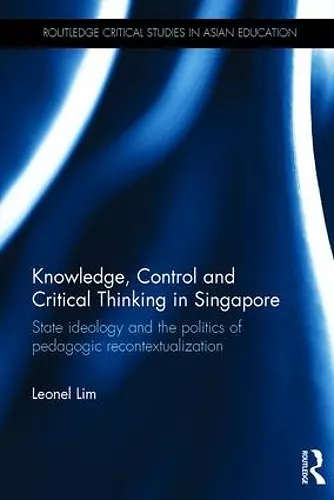Knowledge, Control and Critical Thinking in Singapore
State ideology and the politics of pedagogic recontextualization
Format:Hardback
Publisher:Taylor & Francis Ltd
Published:21st Sep '15
Currently unavailable, and unfortunately no date known when it will be back
This hardback is available in another edition too:
- Paperback£48.99(9781138575899)

This book examines how critical thinking is regulated in Singapore through the process of what the influential sociologist of education Basil Bernstein termed "pedagogic recontextualization". The ability of critical thinking to speak to alternative possibilities and individual autonomy as well as its assumptions of a liberal arrangement of society is problematized in Singapore’s socio-political climate. By examining how such curricular discourses are taken up and enacted in the classrooms of two schools that cater to very different groups in society, the book foregrounds the role of traditional high-status knowledge in the elaboration of class formation and develops a critical understanding of post-developmental state initiatives linked to the parable of modernization in Singapore.
Knowledge, Control and Critical Thinking in Singapore offers chapters on:
• Critical Thinking and the Singapore State: Meritocracy, Illiberalism and Neoliberalism
• Sacred Knowledge and Elite Dispositions: Recontextualizing Critical Thinking in an Elite School
• Power, Knowledge and Symbolic Control: Official Pedagogic Identities and the Politics of Recontextualization
This book will appeal to scholars in comparative education studies, curriculum studies and education reform. It will also interest scholars engaged in Asian studies who are struggling to understand issues of education policy formation and implementation, particularly in the areas of critical thinking and other knowledge skills.
Leonel Lim’s Knowledge, Control and Critical Thinking in Singapore is a timely intervention in the now buoyant accumulation of educational writing on curriculum reform through critical thinking. Singapore, after all, has become the idealized and paradigmatic model of education reform and achievement for educational systems across the globe. Lim’s book reminds us, however, that even the most innovative and ameliorative discourses in education must be materially grounded and evaluated in the light of real-existing conditions and experiences for social subjects in the school setting. In this novel text, Lim puts on display tremendous theoretical gifts grounded in Bernsteinian and Bourdieuian understandings of the stratified-status value attached to curriculum knowledge. Lim’s research focus is on the role of high-status knowledge in the elaboration of class formation and post-developmental state initiatives linked to the parable of modernization in Singapore. Lim writes with a distinctive voice. And, Knowledge, Control and Critical Thinking in Singapore is an elegant deployment of Bernsteinian analysis to the post-developmental context of education. Empirically grounding theoretical claims in a comparative case study of the official national curriculum with the lived curriculum that is actually enacted in schools attended by Singapore’s elite youth and those attended by students who are considerably less advantaged, this brilliant volume sheds light on the consequences of the technocratic curriculum goals of an interventionist, post-developmental state. It trenchantly calls attention to the real-existing opportunity costs for less advantaged youngsters and to the limits of innovative programs under the neoliberal post-developmental paradigm that guides Singapore. It should be required reading for contemporary students of curriculum studies wherever they are. - Cameron McCarthy, University Scholar and Hardie Fellow, Institute of Communications Research, University of Illinois
The performance of Asian nations, such as Singapore and China, in international test league tables has captured the imagination of educational sociologists around the world. In this magnificent book, Lim explores how critical thinking curriculum is incorporated into the official discourses of the Singapore Ministry of Education and differentially distributed to students attending elite and less advantaged schools. Lim’s contribution to the sociology of education is threefold. First, he advances work in curriculum studies by extrapolating and applying the sociological theories of Basil Bernstein to a study of curriculum production, recontextualisation, and enactment. Second, he advances work in pedagogic governance by exploring the ways in which the state in Singapore simultaneously juxtaposes illiberal, neoliberal and meritocratic discourses to govern whole populations through pedagogic means. Thirdly, he advances research in critical scholarship by exploring both the substantive content and procedural, process aspects of critical thinking and how critical thinking curriculum is pedagogised in schooling systems. - Parlo Singh, Professor of Education, Griffith Institute for Educational Research, Griffith University
Lim is to be commended for his brave attempt to extend Bernstein’s theory of codes to the study of the relationships between power relations, official and implemented curricula, and pedagogic interactions and identities within an illiberal state such as Singapore. His book will be crucial reading for scholars in curriculum theory and education reform. - Jason Tan, Policy & Leadership Studies, National Institute of Education, Singapore
'The book’s exegesis of Bernstein’s theory is first-rate. All students and scholars frustrated by Bernstein’s obscure and difficult texts will find Lim’s clear and insightful theoretical explications useful.' - Ting-Hong Wong, Associate Research Fellow, Sociology Institute, Academia Sinica, Taiwan
ISBN: 9781138887480
Dimensions: unknown
Weight: 430g
194 pages